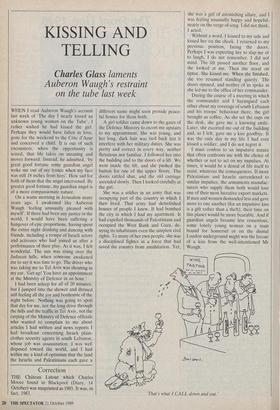KISSING AND TELLING
Charles Glass laments
Auberon Waugh's restraint on the tube last week
WHEN I read Auberon Waugh's account last week of 'The day I nearly kissed an unknown young woman on the Tube', I rather wished he had kissed the girl. Perhaps they would have fallen in love, gone for the weekend to the Cote d'Azur and conceived a child. It is out of such encounters, when the opportunity is seized, that life takes on meaning and moves forward. Instead, he admitted, `by great good fortune some guardian angel woke me out of my trance when my face was still 18 inches from hers'. How sad for both of them that the angel intervened. By greater good fortune, my guardian angel is of a more compassionate nature.
On a warm morning in Jerusalem many years ago, I awakened like Auberon Waugh 'feeling unusually pleased with myself. If there had been any justice in the world, I would have been suffering a hangover of epic proportions, having spent the entire night drinking and dancing with friends, including a troupe of Israeli actors and actresses who had joined us after a performance of their play. As it was, I felt wonderful. The sun was rising over the Judaean hills, when someone awakened me to say it was time to go. The driver who was taking me to Tel Aviv was shouting in my ear, 'Get up! You have an appointment at the Ministry of Defence in an hour.'
I had been asleep for all of 20 minutes, but I jumped into the shower and dressed still feeling all the joy and bonhomie of the night before. Nothing was going to spoil that day for me, not the long drive through the hills and the traffic in Tel Aviv, not the carping of the Ministry of Defence officials who wanted to complain to me about articles I had written and news reports I had broadcast concerning Israeli plain- clothes security agents in south Lebanon, whose job was assassination. I was well disposed toward the world, and I had within me a kind of optimism that the land the Israelis and Palestinians each gave a different name might soon provide peace- ful homes for them both.
A girl soldier came down to the gates of the Defence Ministry to escort me upstairs to my appointment. She was young, and her long, dark hair was tied back lest it interfere with her military duties. She was pretty and correct in every way, neither flirtatious nor familiar. I followed her into the building and to the doors of a lift. We went inside the lift, and she pushed the button for one of the upper floors. The doors rattled shut, and the old carriage ascended slowly. Then I looked carefully at the girl.
She was a soldier in an army that was occupying part of the country in which I then lived. That army had demolished houses of people I knew. It had bombed the city in which I had my apartment. It had expelled thousands of Palestinians and occupied the West Bank and Gaza, de- nying its inhabitants even the simplest civil rights. To many of her own people, she was a -disciplined fighter in a force that had saved the country from annihilation. Yet,
she was a girl of astonishing allure, and I was feeling unusually happy and hopeful, nearly on the verge of song. I did not think, I acted.
Without a word, I leaned to my side and kissed her on, the cheek. I returned to my previous position, facing the doors. Perhaps I was expecting her to slap me or to laugh, I do not remember. I did not mind. The lift passed another floor, and she looked at me. Then she stood on tiptoe. She kissed me. When she finished, she too resumed standing quietly. The doors opened, and neither of us spoke as she led me to the office of her commander.
During the course of a meeting in which the commander and I harangued each other about my coverage of south Lebanon and his troops' behaviour there, the girl brought us coffee. As she set the cups on the desk, she gave me a knowing smile. Later, she escorted me out of the building and, as I left, gave me a kiss goodbye. It was the only day in my life I had ever kissed a soldier, and I do not regret it.
I must confess to an impulsive nature that often confronts me with the choice of whether or not to act on my impulses. At times, it would be a denial of life itself to resist, whatever the consequences. If more Palestinians and Israelis surrendered to similar impulses, the armaments manufac- turers who supply them both would lose one of their most lucrative export markets. If men and women demanded less and gave more to one another (for an impulsive kiss is a gift rather than a theft), their time on this planet would be more bearable. And if guardian angels became less censorious. some lonely young woman on a train bound for Somerset or on the dismal London underground might win the favour of a kiss from the well-intentioned Mr Waugh.
'That's what I CALL down and out.'


























































 Previous page
Previous page